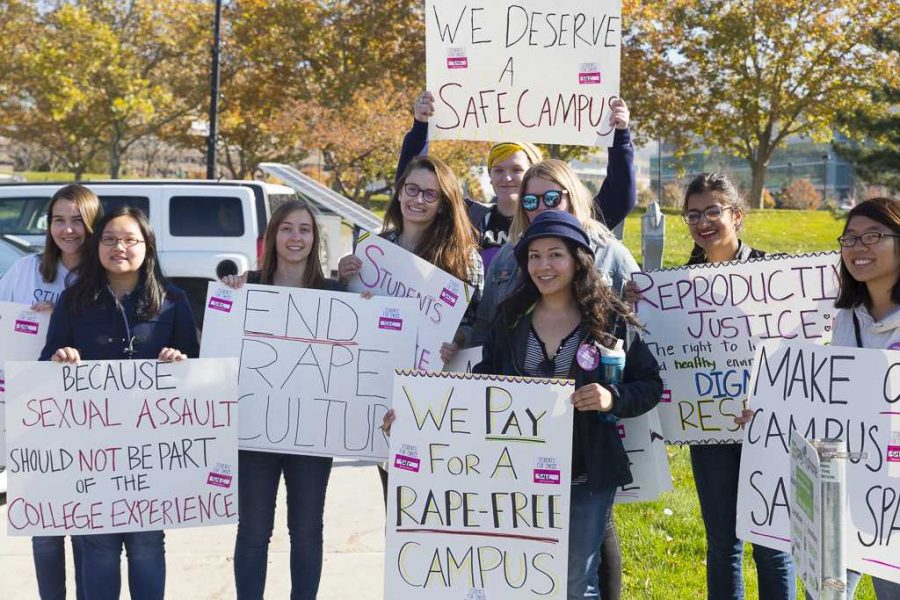On Nov. 16, the U.S. Department of Education (DOE), led by Secretary of Education Betsy DeVos, proposed several regulations to Title IX that would drastically alter how universities investigate sexual misconduct allegations. Title IX is a federal law that prohibits gender discrimination and ensures equal access at educational institutions that receive federal funding.
In a statement issued by the University of Utah immediately following the proposed regulations, Sherrie Hayashi, the U’s Title IX coordinator and director of the Office of Equal Opportunity (OEO) and Affirmative Action wrote, “We are reviewing the proposed regulations closely and remain committed to fostering a professional working and learning environment for all members of our campus community.”

The DOE has provided a 60-day public comment period that is now open to allow schools to discuss the propositions. “Regulations will not go into effect until this period closes and the department reviews the comments,” Hayashi said. “We will continue to monitor the proposed regulations closely and will inform the campus if these regulations require any changes to the university’s policies and practices.”
Annalisa Purser, associate director of communications for University Marketing and Communications, said “anybody can provide comment during this period to the federal government, whether as an individual or an organization.”
The Federal Education Department defended the proposed regulations, saying they are better aligned with the “text and purpose of Title IX” and judicial precedent than current regulations and said students reporting sexual harassment will have more control over the process under the new rules. Supporters of DeVos’s proposal also believe the regulations will afford further due process to people accused of sexual misconduct, and universities investigating complaints may face reduced liability.
Others worry that, under the new regulations, universities will be allowed to take less responsibility for investigating claims, which will present further barriers for victims seeking justice. Christina Bargelt, the president of the U’s It’s On Us chapter said, “I speak for myself and It’s On Us at the University of Utah when I say this, we greatly oppose these changes because they punish survivors for being survivors and place many more unnecessary burdens on survivors while protecting rich institutions that don’t need protections.” It’s On Us was launched under the Obama administration as a national campaign against sexual assault on college campuses.

Bargelt, a survivor herself, said, “I think the fact that I was usually frustrated as a survivor during my investigative process, and it took the greater part of a year to complete means that due process was definitely being honored.”
Ellie Goldberg, a Victim-Survivor Advocate at the Center for Student Wellness, explained that due process is “something that the university’s processes have always included, and the Office for the Dean of Students has always been a resource to students who are going through an OEO investigation to help provide them with resources and support which are offered to both the respondent and the complainant.”
Current Title IX rules require colleges to review all student complaints of sexual misconduct regardless of where they occur or how they came to light. Under the new regulations, schools would only be required to investigate allegations if they occur on campus or in other areas controlled by the university. Many students express concerns about how these changes would negatively impact students whose assault occurred off campus by another person who is tethered to their education, such as another student or faculty member.
DeVos’s plan also raises the standard of evidence required in sexual assault accusations from a “preponderance of the evidence” to “clear and convincing” evidence. Accused students will also be able to cross-examine an alleged victim.
Bargelt warns that “rape culture and myths are ingrained in our society which creates inherent bias. There is already such a fear that survivors will not be believed if they come forward, and this change would exasperate that fear.”
While it is difficult to predict how these proposed regulations will affect U students until the 60-day public comment period is over, Purser hopes that students at the U know that the university’s “primary concern is always going to be around student safety, well-being and making sure that they have access to the resources and services they need so that they can be successful in their academic pursuits and in anything that they chose to do.”
Goldberg said, “I would love for there to be more awareness on campus about what resources are available to students, as well as mandatory reporting vs. confidentiality because there is a lot of confusion about that, not only among students but also among the faculty and staff who are mandatory reporters.”
If you or someone you know is struggling with sexual assault, rape, stalking, domestic violence or interpersonal violence, please reach out to Victim-Survivor Advocates at [email protected], or the It’s On Us Utah chapter at [email protected].


